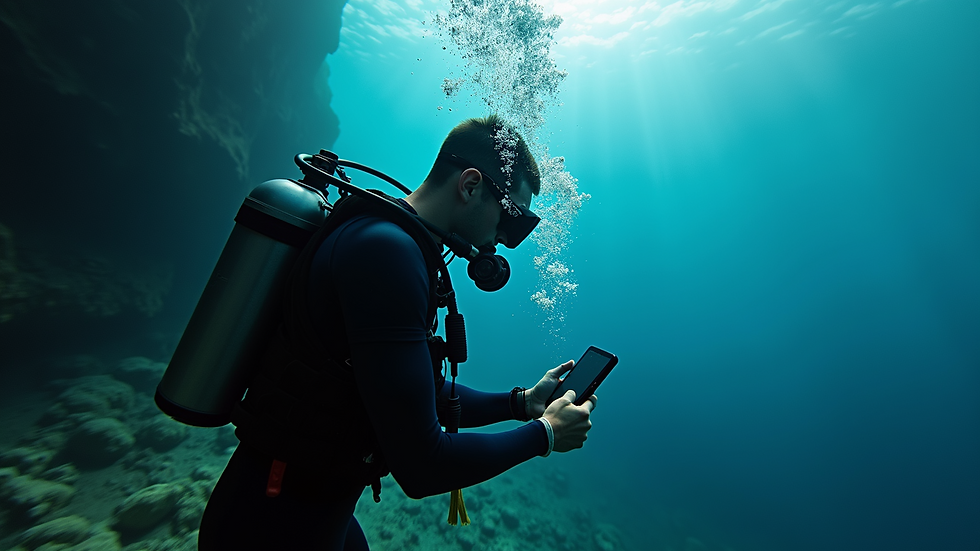Essential Scuba Diving Tips for Beginners
- Chris Dailey
- Oct 3, 2025
- 4 min read
Diving into the world of scuba can feel like stepping into a whole new universe. The ocean is vast, mysterious, and incredibly inviting. If you’re just starting out, you might be wondering where to begin or how to make your first dives safe and enjoyable. I’ve been there, and I want to share some practical advice that helped me get comfortable underwater. Whether you’re gearing up for your first lesson or planning your first open water dive, these tips will help you feel confident and ready to explore.
Getting Started with Scuba Diving for New Divers
Starting scuba diving is exciting but can also be a bit overwhelming. There’s gear to learn, skills to master, and safety rules to follow. The good news? You don’t have to figure it all out at once. Here’s how I approached it:
Take a certified course: Enroll in a reputable beginner course like PADI Open Water or SSI Open Water Diver. These courses cover everything from equipment use to underwater communication.
Practice in a pool first: Before heading to open water, get comfortable with your gear and breathing underwater in a controlled environment.
Ask questions: Don’t hesitate to ask your instructor or dive buddies anything. No question is too small when it comes to safety and comfort.
Get familiar with your equipment: Learn how to assemble, check, and maintain your gear. Knowing your equipment well can prevent many common issues underwater.
One thing I found incredibly helpful was to focus on relaxing and enjoying the experience rather than rushing through the skills. Scuba diving is as much about the journey as the destination.

Essential Scuba Diving Tips for Beginners You Should Know
If you’re looking for some solid scuba diving tips for beginners, here are a few that made a big difference for me:
Equalize early and often: Your ears need to adjust to pressure changes as you descend. Start equalizing before you feel discomfort and keep doing it regularly.
Breathe slowly and deeply: Panicking or holding your breath can cause problems. Focus on slow, steady breaths to conserve air and stay calm.
Stay close to your buddy: Always dive with a buddy and keep an eye on each other. It’s safer and more fun to share the experience.
Control your buoyancy: Mastering buoyancy control is key to moving effortlessly and protecting the environment. Practice using your BCD (buoyancy control device) and breathing to float or sink gently.
Plan your dive and dive your plan: Know your entry and exit points, maximum depth, and bottom time. Stick to your plan to avoid surprises.
These tips might seem simple, but they’re the foundation of safe and enjoyable diving. I remember my first dive when I forgot to equalize early and ended up with a painful ear squeeze. Lesson learned!

What is the 120 Rule in Diving?
One of the safety guidelines I learned early on is the 120 rule. It’s a simple way to help prevent decompression sickness, which can happen if you ascend too quickly or spend too much time at depth.
Here’s how it works:
Add your maximum depth in feet to your total dive time in minutes.
The sum should not exceed 120.
For example, if you dive to 60 feet and your dive lasts 50 minutes, 60 + 50 = 110, which is within the safe limit. But if you dive to 80 feet for 50 minutes, 80 + 50 = 130, which exceeds the 120 rule and means you should shorten your dive or reduce your depth.
This rule is a quick check to keep your dives within no-decompression limits, but always follow your dive computer or dive tables for precise guidance. It’s a handy tool for new divers to understand the relationship between depth and time underwater.

Tips for Handling Common Challenges Underwater
Diving isn’t always smooth sailing, especially when you’re new. Here are some common challenges and how I learned to handle them:
Foggy mask: Before your dive, rinse your mask with fresh water and use a defog solution or even saliva to prevent fogging.
Water in your mask: If water leaks in, don’t panic. Tilt your head back, lift the mask slightly, and exhale through your nose to clear it.
Feeling cold: Wear a wetsuit appropriate for the water temperature. If you get cold, keep moving gently to maintain circulation.
Equipment issues: Practice clearing your regulator and replacing it underwater during training. Knowing these skills builds confidence.
Buoyancy problems: If you’re sinking or floating uncontrollably, adjust your BCD and control your breathing. Slow, deep breaths help stabilize your position.
Remember, every diver faces these issues at some point. The key is to stay calm and use your training to solve problems. It’s all part of becoming a skilled diver.
Building Confidence and Enjoying Your Underwater Adventures
The more you dive, the more comfortable you’ll become. Here are some ways I built my confidence and made the most of my underwater time:
Dive regularly: Practice makes perfect. The more you dive, the more natural it feels.
Explore different environments: Try diving in lakes, reefs, and wrecks to expand your skills and experiences.
Join a dive community: Connecting with other divers, like through The Dailey Dive community, can provide support, tips, and new friends.
Keep learning: Take advanced courses or specialty dives to improve your skills and knowledge.
Respect the ocean: Always follow responsible diving practices to protect marine life and habitats.
Diving is not just a sport; it’s a way to connect with nature and discover a hidden world. Every dive is a new story waiting to be told.



Comments